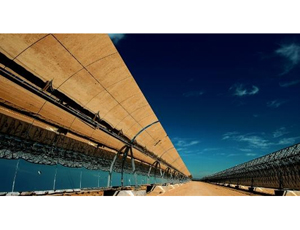
Units of Shikun & Binui Holdings Ltd., the Israeli real estate, construction, water and energy conglomerate, won key roles last month on high-profile projects domestically and in Africa.
Subsidiary Shikun & Binui Renewable Energy and its Spanish partner, Abengoa SA, make up a consortium called Negev Energy, which won an Israeli government build-operate-transfer (BOT) tender for a 121-MW solar-thermal powerplant in Ashalim, in the country's Negev region.
The project, expected to cost more than $1 bilion, will be among the world's largest solar-thermal facility when it begins operation in 2017, the firm says.
Solar-thermal plants can store solar energy and supply it on a 24-7 basis.
The BOT tender involves the planning, financing, building and operation of the powerplant at Ashalim. Under the terms of the contract, Negev Energy will operate the powerplant for 28 years.
The Israeli government's inter-ministerial committee agreed to a price of $0.21 (U.S.) per kilowatt hour. The Finance Ministry said that amount is low relative to international standards for solar-thermal electricity.
Last November, a consortium comprising France's Alstom SA and U.S.-based BrightSource Energy Inc. won a tender to build a similar powerplant at Ashalim. The consortium is using solar-thermal technology developed by BrightSource. In addition, the government awarded a contract for a 30-MW photovoltaic plant at the same site to Ashalim Sun PV, a U.S.-Israeli joint venture.
Together, the three plants will account for 2% of Israel’s electricity generation capacity. The total value of the three projects is estimated at more than $700 million.
Shikun & Binui's Solel Boneh International Infrastructure Ltd. unit also won a $580-million contract last month for an 84-kilometer reconstruction and widening of the Ibadan-Lagos highway in Nigeria, the firm's second such contract in the country in two years.
The section between the cities of Ibadan and Shagamu is part of an expansion of the highway that runs between Nigeria’s financial-and-business hub, Lagos, and the country’s third-largest city, Ibadan. The work includes widening the highway, improving drainage, and rebuilding and maintaining 14 bridges and overpasses.
The upgrading is expected to be completed in three years.
Last year, Solel Boneh won a contract worth $390 million from the Nigerian government to pave and widen a section of the Shagamu-Benin highway.
Foreign infrastructure work continues to be an increasingly important revenue and profit source for the Israeli company, according to analysts.

Post a comment to this article
Report Abusive Comment